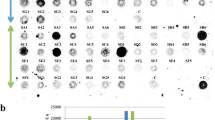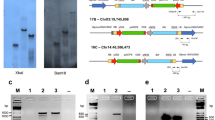Abstract
Infestations of stored legume seeds by bruchid beetles, such as the cowpea weevil and the Azuki bean weevil cause substantial economic and nutritional losses of these food crops, especially in developing countries. Seeds of the common bean are resistant to these bruchids largely because of the presence of α-amylase inhibitor (αAI-Pv), a seed protein that is toxic to the larvae. The αAI-Pv gene is therefore a candidate for a genetic engineering approach that would make other legumes (pea, chickpea, cowpea, Azuki bean) resistant to bruchid infestations. We tested this possibility by transforming peas (Pisum sativum) with the αAI-Pv gene driven by a strong seed-specific promoter. The levels of αAI protein in the pea seeds were as high as in bean seeds and the peas were resistant to the cowpea and Azuki bean weevils.
This is a preview of subscription content, access via your institution
Access options
Subscribe to this journal
Receive 12 print issues and online access
$209.00 per year
only $17.42 per issue
Buy this article
- Purchase on Springer Link
- Instant access to full article PDF
Prices may be subject to local taxes which are calculated during checkout
Similar content being viewed by others
References
Wilson, F.D., Flint, H.M., Deaton, W.R., Fischoff, D.A., Perlak, F.J., Armstrong, J.A., Fuchs, R.L., Berberich, S.A., Parks, N.J. and Stapp, V.B.R. 1992. Resistance of cotton lines containing a Bacillus thuringiensis toxin to pink bollworm (Lepidoptera: Gelichiidae) and other insects. J. Econ. Entomol. 85: 1516–1521.
Augustine, J.J., Delannay, X., Dodson, R.B., Fischoff, D.A., Fuchs, R.L., Greenplate, J.T., LaVallee, B.T., Layton, J.G., Marrone, P.G. and Proksh, R.K. 1989. Field performance of transgenic tomato plants expressing the Bascillus thuringiensis Var. Kurstaki insect control protein. Bio/Technology 7: 1265–1269.
Gasser, C.S. and Fraley, R.T. 1992 Transgenic crops. Sci. Am. 266: 62–70.
An, G., Johnson, R., Narvaez, J. and Ryan, C.A. 1989. Expression of protein-ase inhibitors I and II in transgenic tobacco plants: Effects on natural defense against M. sexta larvae. Proc. Natl. Acad. Sci. USA 86: 9871–9875.
Hilder, V.A., Gatehouse, A.M.R., Sheerman, S.E., Barker, R.F. and Boulter, D. 1987. A novel mechanism ofinsect resistance engineered into tobacco. Nature 330: 160–163.
Chrispeels, M.J. and Raikhel, N.V. 1991. Lectins, iectin genes and their role in plant defense. Plant Cell 3: 1–19.
Huesing, J.E., Shade, R.E., Chrispeels, M.J. and Murdock, L.L. 1991. α-Amylase inhibitor, not phytohemagglutinin explains the resistance of common bean seeds to cowpea weevil. Plant Physiol. 96: 993–996.
Foard, D.E., Murdock, L.L. and Dunn, P.E. 1983. Engineering of crop plants with resistance to herbivores and pathogens: An approach using primary gene products, p. 223–233. In: Plant Molecular Biology—UCLA Symposium on Molecular and Cellular Biology, New Series. Goldberg, R. (Ed.). Alan R. Liss, New York.
Murdock, L.L., Shade, R.E. and Pomeroy, M.A. 1988. Effects of E-64, a cysteine proteinase inhibitor, on cowpea weevil growth, development, and fecundity. Environ. Entomol. 17: 467–469.
Caswell, G.H. 1968. The storage of cowpea in the northern states of Nigeria. Proc. Agric. Soc. Nigeria 5: 4–6.
Murdock, L.L., Huesing, J.E., Nielsen, S.S., Pratt, R.C. and Shade, R.E. 1990. Biological effects of plant lectins on the cowpea weevil. Phytochemistry 29: 85–89.
Ishimoto, M. and Kitamura, K. 1989. Growth inhibitory effects of an α-amylase inhibitor from kidney bean, Phaseolus vulgaris (L.) on three species of bruchids (Coleoptera: Bruchidae). Appl. Ent. Zool. 24: 281–286.
Schroeder, H.E., Schotz, A.H., Wardley-Richardson, T., Spencer, D. and Higgins, T.J.V. 1993. Transformation and regeneration of two cultivars of pea (Pisum sativum L.). Plant Physiol. 101: 751–757.
Altabella, T. and Chrispeels, M.J. 1990. Tobacco plants transformed with the bean aai gene express an inhibitor of insect α-amylase in their seeds. Plant Physiol. 93: 805–810.
Janssen, B.-J. and Gardner, R.C. 1989. Localized transient expression of GUS in leaf disks following cocultivation with Agrobacterium . Plant Mol. Biol. 14: 61–72.
Bernfeld, P. 1955. Amylases, α and β . Methods in Enzymol. 1: 149–158.
Shade, R.E., Pratt, R.C. and Pomeroy, M.A. 1987. Development and mortality of the bean weevil, Acanthoscelides obtectus (Coleoptera: Bruchidae), on mature seeds of tepary beans, Phaseolus acutifolius, and common beans, Phaseolus vulgaris . Environ. Entomol. 16: 1067–1070.
Author information
Authors and Affiliations
Rights and permissions
About this article
Cite this article
Shade, R., Schroeder, H., Pueyo, J. et al. Transgenic Pea Seeds Expressing the α-Amylase Inhibitor of the Common Bean are Resistant to Bruchid Beetles. Nat Biotechnol 12, 793–796 (1994). https://doi.org/10.1038/nbt0894-793
Received:
Accepted:
Issue Date:
DOI: https://doi.org/10.1038/nbt0894-793
This article is cited by
-
Molecular cloning and characterization of an alpha-amylase inhibitor (TkAAI) gene from Trichosanthes kirilowii Maxim.
Biotechnology Letters (2022)
-
Effect of α-glycosidase inhibitors from endophytic fungus Alternaria destruens on survival and development of insect pest Spodoptera litura Fab. and fungal phytopathogens
Scientific Reports (2019)
-
An Update on Genetic Modification of Chickpea for Increased Yield and Stress Tolerance
Molecular Biotechnology (2018)



